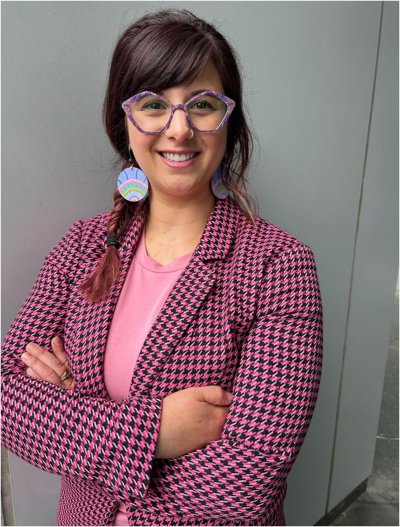An Alternative Wayfinding Map Design for Map Illiterate Tourists
Erin Koletsis is a PhD student in the department of Geo-information Processing. (Co-)Supervisors are prof.dr. M.J. Kraak from the faculty of Geo-Information Science and Earth Observation and dr. A. Griffin and prof. W. Cartwright from RMIT University.
 This thesis investigated the challenges experienced by map illiterate pedestrians when wayfinding in an unfamiliar urban environment. Solutions for the challenges identified were explored, and a proof-of-concept app was developed and tested.
This thesis investigated the challenges experienced by map illiterate pedestrians when wayfinding in an unfamiliar urban environment. Solutions for the challenges identified were explored, and a proof-of-concept app was developed and tested.
It is not uncommon for people to express their inability to read a map, or even for other people to reveal that someone they know cannot read a map. Given the pervasiveness of this phenomenon, people with poor map reading skills are often left behind when wayfinding solutions are designed. More often, it’s the skills of the user that are said to require improvement, rather than the wayfinding solution. Aside from COVID-19 which led to global travel restrictions, people constantly move about the environment and are often required to travel to unfamiliar locations, such as when visiting a new restaurant, attending a job interview, or travelling as a tourist, to name a few reasons. For those who struggle to read maps, these activities can be complicated by their poor spatial abilities. At best, poor map reading abilities may lead to inconvenience, but at worst, an incorrect decision can be fatal; like when a mother and son were lost for five days in California’s Death Valley during the Summer of 2009 which resulted in the death of the son. Therefore, to address this phenomenon, three studies were completed to first identify the challenges experienced by this user group, and then to test a proof-of-concept solution.
In Study 1, participants completed a route-planning and wayfinding activity using a mobile map application. Participants were assigned and assumed the role of Job Applicant or Tourist. Participants in the Job Applicant group were advised to find their way as quickly as possible between their origin and destination, while those in the Tourist group were advised to take their time and visit other points of interest along the way. This study took place in a small city with a complex road network. The aim was to identify challenges that map users experience when using a mobile map application to find their way.
In Study 2, participants used a paper map to plan their route and then find their way along their route. This study took place in a large city, with a regular road network. The aim was to identify challenges map users experience when using a paper map. Again, participants were separated into Job Applicant and Tourist groups. The findings of these two studies were used to inform the design of a proof-of-concept app which aimed to address the challenges experienced by this user group.
In Study 3, participants used the proof-of-concept app to find their way between the origin and destination. Participants were divided into two groups. One group traversed the route in one direction, while the other group traversed the route in the reverse direction. The findings of this study indicate that by identifying the challenges experienced by map illiterate users, wayfinding solutions can be designed that successfully support these users in an unfamiliar urban location.





